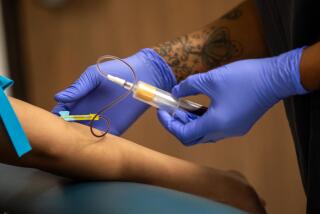Hepatitis C cases prompt officials to urge tests for 500 patients of L.A. clinic
Los Angeles County health officials are investigating why six patients who had procedures at an L.A. clinic were diagnosed with hepatitis C, a liver infection that is spread through infected blood.
Health investigators sent letters to 500 patients of Westside Multispecialty Medical Group asking that they be tested for the disease. Most people who are infected with hepatitis C do not have any symptoms, so testing is the only way to understand the scope of the problem.
Left untreated, people with hepatitis C can go on to develop liver failure and liver cancer.
Health officials are recommending that anyone who received injections, infusions or procedures at the clinic between January 2016 and December 2018 also be tested for hepatitis A and HIV, which can also be spread through blood. No cases of those diseases have been identified yet.
Hepatitis C is typically transmitted through sharing needles or other equipment used to inject drugs. But before officials began more thoroughly screening blood donors in 1992, many hepatitis C cases were caused by blood transfusions and organ transplants, according to the U.S. Centers for Disease Control and Prevention.
“Public Health does not yet know if an unsafe practice in this clinic led to spread of hepatitis C,” reads a health department fact sheet for people who received the letters. “In hospitals or clinics, hepatitis C can also spread through poor infection control procedures, such as unsafe injections.”
The clinic, which is on Wilshire Boulevard, was ordered by the health department to cease all procedures and injections during the investigation. The clinic decided to close fully during the investigation, according to health officials.
A message left on the clinic’s voicemail was not immediately returned.
The health department is offering free hepatitis C testing for anyone who visited the clinic in the last two years.
“The chances of becoming infected are unknown,” reads the fact sheet for patients. “Because many people who have been infected do not have any symptoms, the only way to know if you have been infected is to have your blood tested.”
soumya.karlamangla@latimes.com
Twitter: @skarlamangla
More to Read
Start your day right
Sign up for Essential California for news, features and recommendations from the L.A. Times and beyond in your inbox six days a week.
You may occasionally receive promotional content from the Los Angeles Times.







